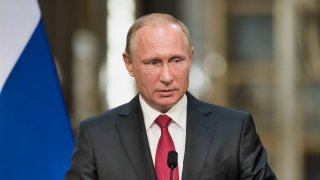The End of Vladimir Putin in Russia? Why It Could Happen
The Kremlin faces a significant popular challenge as nearly 300,000 Russians demonstrated against the regime over seven weeks, marking the most substantial public dissent since 2021. Protests ranged from support for environmental activist Fail Alsynov, presidential candidate Boris Nadezhdin, to honoring murdered opposition figure Alexei Navalny.
Summary: The Kremlin faces a significant popular challenge as nearly 300,000 Russians demonstrated against the regime over seven weeks, marking the most substantial public dissent since 2021. Protests ranged from support for environmental activist Fail Alsynov, presidential candidate Boris Nadezhdin, to honoring murdered opposition figure Alexei Navalny.
Mass Protests Challenge Putin's Regime: A New Era of Russian Dissent Unfolds
The Kremlin regime is under unprecedented popular assault, but its leaders continue to pretend that all is well. Pride may or may not go before the fall. But daftness certainly does.
On Jan. 15, Jan. 17, and Jan. 19, up to 10,000 Bashkirs demonstrated in support of Fail Alsynov, an environmental activist and Bashkir patriot who opposed Russia’s invasion of Ukraine and received a four-year prison sentence.
In late January and early February, some 200,000 Russians stood in long lines to express their support of Boris Nadezhdin’s candidacy for president. Fearful of the embarrassment that a good showing by the upstart would deliver to Russia’s current illegitimate President, Vladimir Putin, the Central Election Commission disqualified Nadezhdin on Feb. 8.
Finally, on March 1-3, as many as 50,000 Russians defied authorities and paid their respects to murdered opposition activist Alexei Navalny. According to Russian analysts, people kept on coming days after the funeral itself.
Why the Kremlin Should Worry
As many as 300,000 citizens of the Russian Federation took to the streets to voice their discontent with the regime in a period of some seven weeks. Russia hasn’t seen such a powerful expression of people power since January 2021, when protesters demonstrated against Navalny’s arrest in 198 cities and towns across Russia. Up to 50,000 Russians protested in Moscow at that time, and up to 10,000 in St. Petersburg. Before that, in 2011-2013, tens of thousands protested against fraudulent legislative and presidential elections.
Put simply, the Russians are coming.
Even as the Putin regime has become more centralized, more repressive, and less responsive, the protest potential of Russians has remained strong. If coercion were all that mattered, Russians should be cowering in their basements. Many no doubt are. Many more no doubt support Putin. But a significant minority, perhaps as many as one million people, has the courage to demand that Putin go, that the war against Ukraine end, and that some semblance of democracy be restored.
The Kremlin should be worried. Putin and his pals should be thinking about where they might find safe havens. Instead, their recent interactions with the public show they are still stuck in the bizarro world they created in order to justify their misrule.
Words Unmoored From Meaning
Putin started the show on Feb. 29 by addressing the Federal Assembly for two very long hours. All commentators, even those friendly to Putin, agreed on that. Putin spent most of the speech promising to spend trillions of rubles on a variety of social amenities, seemingly oblivious to the fact that Russia doesn’t have the money to meet even a fraction of the promised expenditures.
He also rattled the nuclear saber again and dismissed as nonsense Western charges that he harbors aggressive designs on his neighbors. Given that Putin’s relationship with truth is tenuous at best, his statements should be interpreted as meaning the exact opposite of what they seem to say. He said he wouldn’t invade Ukraine, but did. He promised not to invade the Balts or Poland: Well, draw your own conclusion.
Equally bereft of any lingering connection to reality are the notoriously unhinged former president and prime minister, Dmitry Medvedev, and the presidential press secretary, Dmitry Peskov. The former routinely threatens to fire nuclear weapons against the West. Now, he regales a youthful audience in Sochi on March 4 with the claim that “Ukraine is definitely Russia,” and that the notion that it’s not “should disappear forever.” It presumably hasn’t occurred to Medvedev that, if he’s right, then it follows that Russia is waging a genocidal war against Russia. Is Mother Russia suffering from schizophrenia perhaps? Are her apologists in the West also deranged?
Barbarians at the Gates
But Peskov took the cake. The press secretary opined on March 6 that “our democracy is the very best and we will continue to build it.” Tens of thousands of Russians and everyone but North Korea, China, and Venezuela would disagree, but, in the time-honored fashion of Joseph Goebbels, Peskov knows that dictatorship is democracy and that killing political opponents is the very best democracy.
The democratic “barbarians” are at the gates, and the Kremlin’s leaders are pretending that all is well. Small wonder that they think they can win against Ukraine and pacify their own population. Detached as they are from reality, Putin and Co. will doubtless keep fiddling even as the Kremlin burns to the ground.
About the Author: Dr. Alexander Motyl
Alexander Motyl is a professor of political science at Rutgers-Newark. A specialist on Ukraine, Russia, and the USSR, and on nationalism, revolutions, empires, and theory, he is the author of 10 books of nonfiction, including Pidsumky imperii (2009); Puti imperii (2004); Imperial Ends: The Decay, Collapse, and Revival of Empires (2001); Revolutions, Nations, Empires: Conceptual Limits and Theoretical Possibilities (1999); Dilemmas of Independence: Ukraine after Totalitarianism (1993); and The Turn to the Right: The Ideological Origins and Development of Ukrainian Nationalism, 1919–1929 (1980); the editor of 15 volumes, including The Encyclopedia of Nationalism (2000) and The Holodomor Reader (2012); and a contributor of dozens of articles to academic and policy journals, newspaper op-ed pages, and magazines. He also has a weekly blog, “Ukraine’s Orange Blues.”


